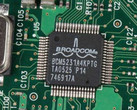Intel has announced support for the IEEE 802.11ax standard with new chipsets for 2x2 and 4x4 home routers, and gateways for cables, xDSL, fiber, and consumer retail devices. The new 802.11ax standard offers considerable improvements over its predecessor, 802.11ac, with up to 40% higher peak data rates for a single client and up to 4x higher average throughput per user in congested environments consequentially increasing network efficiency and battery life of clients.
The new Intel chipsets will be based on Draft 2.0 of the 802.11ax standard and it is important for all infrastructure devices to adhere to Draft 2.0 and not Draft 1.0, to ensure interoperability. Only Draft 2.0 devices will be eligible for 802.11ax certification and get the Wi-Fi Certified badge. Devices based on 802.11ax Draft 1.0 will suffer from a suboptimal experience and increased interference.
Intel is helping OEMs to smoothly transition to the new standard by upgrading its WAV500 Series home Wi-Fi chipsets to 802.11ax without needing to change the host SoC. Chipsets upgraded to 802.11ax will also offer backward compatibility with existing Wi-Fi technologies. The new chipsets can connect up to 256 devices and can deliver enhanced throughput for a wide range of packet sizes. Wi-Fi traffic is offloaded from the SoC to the chipset, thereby, freeing up the SoC for software and security functions.














